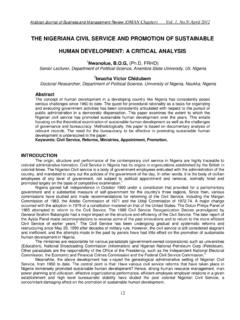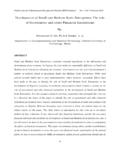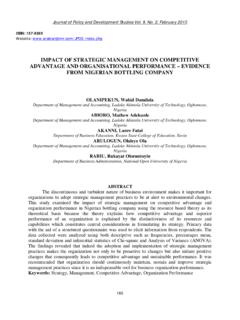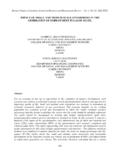Transcription of CORPORATE GOVERNANCE AND FORENSIC …
1 International Journal of Accounting Research Vol. 1, , 2013. CORPORATE GOVERNANCE AND FORENSIC accountants ' ROLE: global regulatory ACTION SCENARIO. Madan Lal Bhasin Professor, Department of Accounting & Finance, Bang College of Business, KIMEP University, Almaty, Republic of Kazakhstan Abstract An increasing number of researchers are finding that poor' CORPORATE GOVERNANCE (CG) is a leading factor in poor performance, manipulated financial reports, and unhappy stakeholders. Corporations and regulatory bodies are now trying to analyse and correct any existing defects in their reporting system. In the current reporting environment, FORENSIC accountants are in great demand for their accounting, auditing, legal, and investigative skills.
2 FORENSIC accountants are positioned to explore the design of CG systems, the role of the financial reporting system in CG, the effect of the GOVERNANCE board on employee and managerial behaviour, and the efficacy of the internal control systems. As part of the GOVERNANCE committee, FORENSIC accountants can make significant contributions in the area of CG, fraud prevention and investigation, creating positive work environment, establishing effective lines of communication and vigilant oversight. An attempt is also made here to portray global regulatory action scenario undertaken by leading bodies to prevent CORPORATE frauds and improve CG through accounting reforms.
3 In nutshell, the FORENSIC Accountant is a blood-hound of book-keeping.. Keywords: CORPORATE GOVERNANCE , FORENSIC accounting, FORENSIC accountant, global regulatory action scenario. 1 INTRODUCTION. Recently, FORENSIC accounting (henceforth, FA) has come into limelight due to rapid increase in financial frauds and white-collar crimes. The integration of accounting, auditing and investigative skills creates the specialty, known as FA. In fact, FA is the specialty' practice area of accounting that describes engagements, which result from actual or anticipated disputes or litigation. FORENSIC '. means suitable for use in a court of law, and it is to that standard and potential outcome that FORENSIC accountants generally have to work [1].
4 FA uses accounting, auditing, and investigative skills to conduct investigations, and thefts and frauds cases. No doubt, FA is listed among the top-20. careers of the future. The job of FORENSIC accountants is to catch the perpetrators of the estimated $600 billion theft and fraud occurring in the US companies every year. This includes tracing money laundering and identity theft activities, as well as, tax evasions [2]. 1. International Journal of Accounting Research Vol. 1, , 2013. Worldwide, we consider Sherlock Holmes to be the first FORENSIC accountant [3]. However, the contribution of some historic characters in India cannot be ignored. In India, Kautilya' was the first person to mention the famous forty ways of embezzlement in his book Arthashastra' during the ancient times.
5 He was the first economist, who openly recognized the need of the FORENSIC accountants . Similarly, Birbal' was the scholar in the time of King Akbar. He used various tricks to investigate various types of crimes. Some of his stories gave the fraud examiner a brief idea about the Litmus test of investigation [4]. In the Egyptian times, 3300-3500 BC, commercial transactions were recorded on clay tablets, these tablets were then sealed, and if the tablets were found to be tampered with later, investigations took place [5]. Employee crime, when discovered was punishable by fine, mutilation or death in some cases. In India (321-184 BC) at least 40 different kinds of embezzlement were recorded and were punishable.
6 The Roman Empire was concerned with administrative control. Emphasis was on control and audit of financial matters rather than efficiency of asset use. They experienced problems, such as, mismanagement of public monies, inflation and bankruptcies. The Romans relied on monetary and non-monetary data for such items as asset control. In the Middle-Ages, the rights of individuals were subsumed into those of a higher rank in society;. the church was also an influence in matters of law, property and politics. The feudal system required rolls and estate accounts to be kept; they provided a base for both legal process and control. There was a formal alliance between law and accounting, The Royal Courts of Justice were responsible for both the accounting and administrative functions of central government.
7 The first official chartered accounting profession in 19th century at Scotland was based on and had strong linkages between accounting and law. In the 20th century, however, accounting services grew and legal consultancy became a smaller and smaller part of most accounting practices [2]. The emphasis was now on record-keeping and other financial services. Thus, FA appears to be a move towards the original role of accountants . Indeed, the 1960's saw the first legal case to highlight the role of FA to business and society. The 1980's saw a rapid expansion in demand for FA services, when many businesses suffered losses from the recession. The Association of Certified Fraud Examiners (ACFE) was established in Texas in 1988 and the American College of FORENSIC Examiners was founded in 1992.
8 These were established because of recognition of the need for trained FORENSIC accountants and to establish educational standards for their training. The sudden increase in the 1990's of white-collar crime, the complexity of technology and the September 11. terrorist attacks, which left many business facing financial ruin after losing almost all their accounting records has fuelled the demand for FA services. Undoubtedly, accountants have been involved in bringing life back into New York based businesses, after September 11, by compiling basic records so as to file insurance claims. They have also been involved in tracing the financing for the attacks finding from where the terrorists got the money?
9 Over the past few years, these issues has been in the spotlight and accountants have been asked to question the traditional' view, , accounting is about assessing whether financial statements meet Generally Accepted Accounting Practices (GAAP) as outlined by their professional bodies [6]. This has been shown, in some cases including Enron and WorldCom, to produce financial statements that may be enhanced to show a rosy' picture to investors [7]. accountants , therefore, need to make sure that their interpretation of GAAP ensures a true and honest representation of accounting data.. Debates the world over about what is true and fair' according to GAAP continue and many professional bodies have chosen to adopt a more regulated approach including the USA.
10 Many 2. International Journal of Accounting Research Vol. 1, , 2013. groups in society are expecting accountants to adopt a more active role in providing assurance regarding reliable financial reporting, responsible CG and detection and prevention of frauds [8]. Perhaps a FORENSIC accountant may have been able to track these complex puzzles before the fallout from these events and highlighted them to investors. Thus, FA may be able to answer such questions as: can the reliability of auditors and the quality of the audit be believed? It was a growing specialty before Enron, WorldCom and Sarbanes-Oxley. Now, it is really hot [9]. In the USA, the Sarbanes-Oxley Act (SOA) of 2002 has forced top management to certify that financial statements are free of fraud and material misstatement [10].









